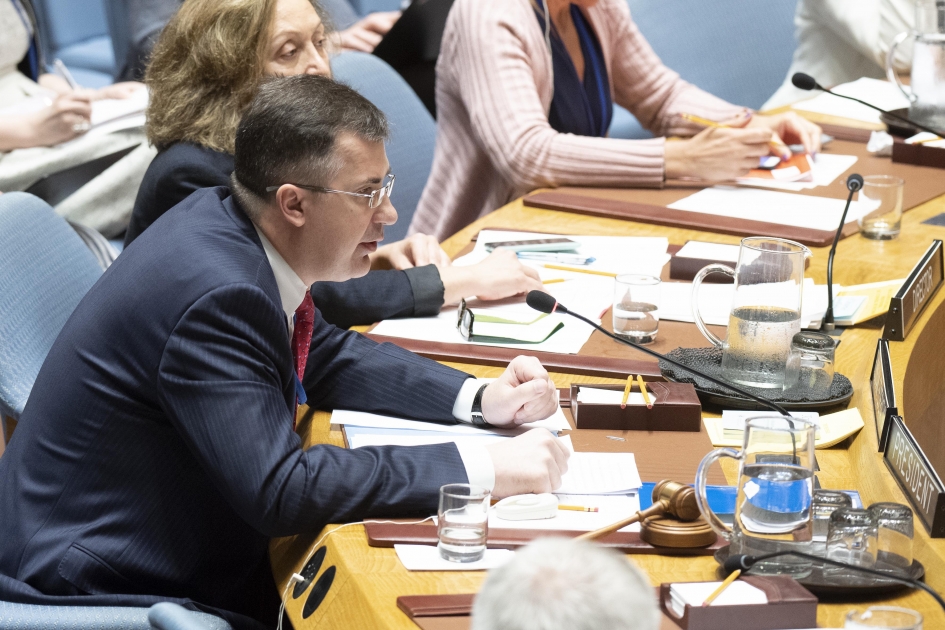Statement by Mr.Gennady Kuzmin, Deputy Permanent Representative of the Russian Federation to the United Nations, at the Security Council on theInternational Residual Mechanism for Criminal Tribunals
Our delegation closely monitors the work of the International Residual Mechanism for Criminal Tribunals, particularly the judicial proceedings conducted within its framework, and we are grateful to the Mechanism’s leaders for their detailed information and reports on that.
We pay close attention to the extent to which it has been able to learn from the activities of the International Criminal Tribunals established by the Security Council. As we know, the history of one of them, the International Tribunal for the Former Yugoslavia (ICTY), was marred by a selective approach to justice, numerous delays in its criminal proceedings and violations of the rights of the accused to a fair trial.
The Mechanism’s current two-year mandate ends on 30 June, as we are all aware. This month the Security Council has to finish reviewing the Mechanism’s activities to date and reflect the results in an appropriate resolution, whose adoption is an essential condition for extending the work of the Mechanism for another two years.
y the end of June, the terms of office of the members of the Register of Judges, the President and the Prosecutor of the Mechanism will expire. Unfortunately, our analysis of the Mechanism’s practice in specific cases confirms that it has inherited the ICTY’s flawed working methods.
The verdict in the case of Vojislav Šešelj is another confirmation of that. Rewriting an acquittal as a guilty verdict with a sentence to time served only underlines the shortcomings of the justice model in the ICTY and Residual Mechanism’s format. Similarly, very typical conclusions about what is going on with the Mechanism can be drawn from the report (S/2018/206) of the Office of Internal Oversight Services (OIOS) prepared for the Security Council’s review.
Judging by the OIOS report, the Mechanism seems to be taking the same line as the ICTY with regard to to both internal administration and personnel policy issues. As a result, the Office indicates that there has been friction between management and workers and a deteriorating atmosphere and low morale among the staff, and Council members have discussed that this morning.
We warned of the danger of this as long as two years ago when a proposal was made to automatically reassign the ICTY leadership to the corresponding posts in the Mechanism. Incidentally, for some reason the extent of the judicial workload came as a surprise to the Mechanism. We are concerned about the OIOS report’s assertions that the Mechanism’s Arusha branch is perceived by some of the staff in The Hague as a field office.
We believe that the Prosecutor and Secretary’s move to Arusha, announced in the report of the President of the Mechanism, will improve administrative harmonization and unity in both branches of the Mechanism as one entity. We also hope that the move will enable the Mechanism’s leadership to concentrate on its mandated activities. Up to now the Prosecutor’s report is still making too much of the issue of combating impunity in the countries of the former Yugoslavia.
It again includes irrelevant evaluations of the prospects for European integration with respect to those countries, including in the context of the related strategy of the European Union. We would like to remind the Council that the Mechanism should not overstep the limits of its mandate and functions. As we have frequently noted, the Residual Mechanism was established in accordance with Security Council resolution 1966 (2010) as a temporary body, with strictly limited powers for completing processes that the ICTY and the International Criminal Tribunal for Rwanda were unable to finish.
That is why its official title includes the word “residual”. The temporary nature of the Mechanism’s mandate requires that its residual functions — including legal proceedings, whose delay on the pretext of reduced funding is unacceptable — be completed as quickly as possible. We would also like to point out that the Mechanism, according to its Statute, does not have the authority to analyse the quality of national judicial systems.
The staff of the Mechanism should not be distracted by any kinds of educational activities or events such as seminars and training sessions, particularly for third countries that are not part of the relevant region. We would especially like to emphasize the importance of protecting the right of the accused to timely, appropriate and high-quality medical care.
Among other things, that right requires using reliable, unembellished information about defendants’ health. The ICTY’s mistakes in that regard must not be repeated in any circumstances. Its legacy is marred by the negligence that led to an entire roster of people dying in custody.
In general, we believe that at this stage, when we have guiding estimates of how long it will take to complete the proceedings in the cases of Ratko Mladić, Jovica Stanišić and Franco Simatović, it is time for the Council to think objectively about winding up the Mechanism’s activities in the foreseeable future.
In conclusion, I want to say that we hope that the Mechanism’s leadership will produce a well-thoughtout plan for the course of its legal proceedings and other statutory activities. We expect reliable projections, maximum efficiency and transparency, as well as strict adherence to judicial standards, including trial timelines. In our view, the Security Council has already provided all procedural and other opportunities for that to the Mechanism.
